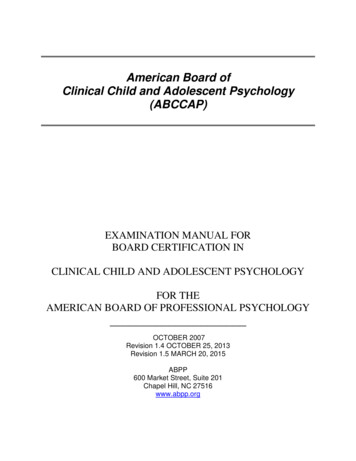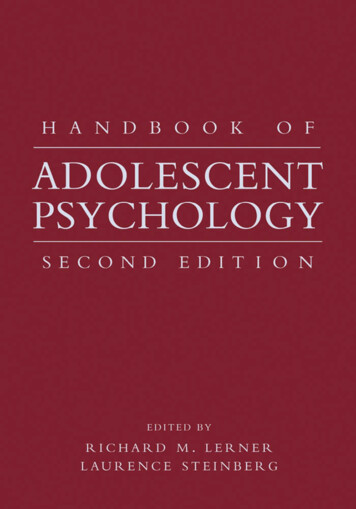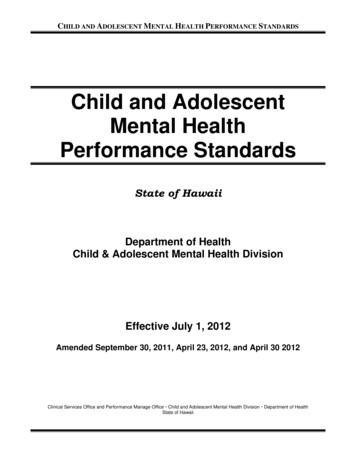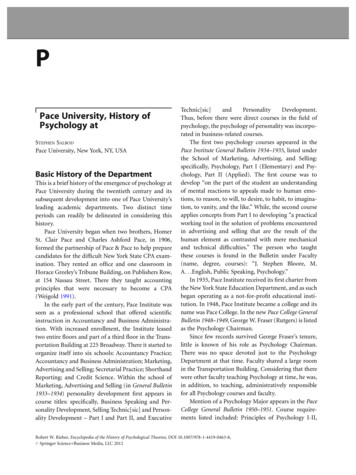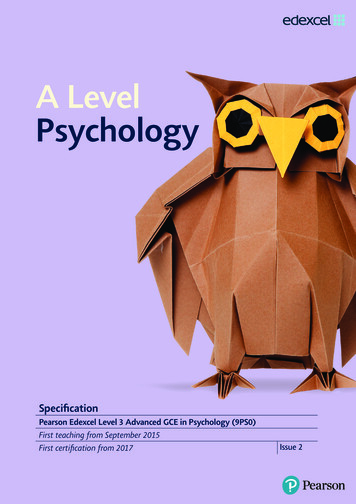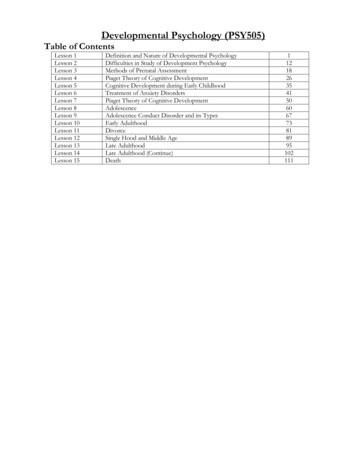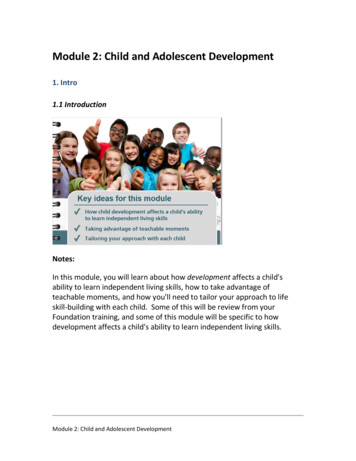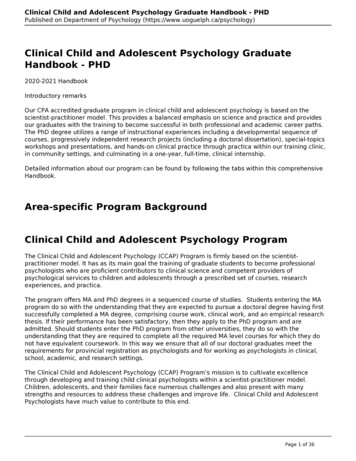
Transcription
Clinical Child and Adolescent Psychology Graduate Handbook - PHDPublished on Department of Psychology (https://www.uoguelph.ca/psychology)Clinical Child and Adolescent Psychology GraduateHandbook - PHD2020-2021 HandbookIntroductory remarksOur CPA accredited graduate program in clinical child and adolescent psychology is based on thescientist-practitioner model. This provides a balanced emphasis on science and practice and providesour graduates with the training to become successful in both professional and academic career paths.The PhD degree utilizes a range of instructional experiences including a developmental sequence ofcourses, progressively independent research projects (including a doctoral dissertation), special-topicsworkshops and presentations, and hands-on clinical practice through practica within our training clinic,in community settings, and culminating in a one-year, full-time, clinical internship.Detailed information about our program can be found by following the tabs within this comprehensiveHandbook.Area-specific Program BackgroundClinical Child and Adolescent Psychology ProgramThe Clinical Child and Adolescent Psychology (CCAP) Program is firmly based on the scientistpractitioner model. It has as its main goal the training of graduate students to become professionalpsychologists who are proficient contributors to clinical science and competent providers ofpsychological services to children and adolescents through a prescribed set of courses, researchexperiences, and practica.The program offers MA and PhD degrees in a sequenced course of studies. Students entering the MAprogram do so with the understanding that they are expected to pursue a doctoral degree having firstsuccessfully completed a MA degree, comprising course work, clinical work, and an empirical researchthesis. If their performance has been satisfactory, then they apply to the PhD program and areadmitted. Should students enter the PhD program from other universities, they do so with theunderstanding that they are required to complete all the required MA level courses for which they donot have equivalent coursework. In this way we ensure that all of our doctoral graduates meet therequirements for provincial registration as psychologists and for working as psychologists in clinical,school, academic, and research settings.The Clinical Child and Adolescent Psychology (CCAP) Program’s mission is to cultivate excellencethrough developing and training child clinical psychologists within a scientist-practitioner model.Children, adolescents, and their families face numerous challenges and also present with manystrengths and resources to address these challenges and improve life. Clinical Child and AdolescentPsychologists have much value to contribute to this end.Page 1 of 36
Clinical Child and Adolescent Psychology Graduate Handbook - PHDPublished on Department of Psychology (https://www.uoguelph.ca/psychology)Philosophy and Training ModelThe Clinical Child and Adolescent Psychology Program is based on the scientist-practitioner model. Ouroverriding programmatic goal is to prepare clinical child psychologists with an orientation that considerspsychopathological processes and relevant diagnostic implications, while also incorporating a solidfoundation in development, including the understanding of the inherent strengths and resources thatchildren, adolescents and families possess. Students are required to demonstrate thorough knowledgeand skill in research, clinical skills (assessment and diagnosis, intervention, clinical supervision), andethics, standards and professionalism.A range of instructional experiences has been designed to operationalize our training model. Throughformal courses and seminars, students are expected to acquire foundational knowledge and skills of thediscipline. The relationship with the thesis supervisor and advisory committee serves to enhance theirability to undertake progressively independent research across the program. Topics in core clinicalcourses specifically address the developmental, academic, social, and emotional challenges thatchildren and adolescents may face such that students are prepared to meet these challenges withrelevant knowledge and skills on practica and internship. Clinical skills are further developed within abroad array of structured training experiences, including ongoing open practica and a focused CBTpracticum in the program’s clinic: The Centre for Psychological Services, as well as external practicumplacements, and predoctoral internship. Additional learning opportunities are available includingmonthly Clinical Program Meetings organized around clinical research, professional issues, and clinicalissues, and special-topic workshops offered to the entire program. We purposefully cultivate a learningcontext to model and foster the highest professional standards in research, teaching, supervision, andclinical practice.ValuesThe CCAP program attempts to foster the following values in our students and faculty as they carry outtheir teaching, research, and professional responsibilities:ExcellenceEthical behaviourIntegration of science, scholarship, and clinical practiceInclusion and responsiveness to diversityCritical inquirySelf-reflectionCompassionFlexibility and creativityCommitment to lifelong learningCommunity engaged and impactful researchEngagement with and service to communitiesPage 2 of 36
Clinical Child and Adolescent Psychology Graduate Handbook - PHDPublished on Department of Psychology ram Goals and ObjectivesWithin a competency framework, our program emphasizes three broad goals, each of which isassociated with a number of more specific objectives:1. The development of scholarly and research skills2. The development of clinical skills3. The development of ethics and professionalismAll of these culminate in the defense of a PhD thesis and the successful completion of one year ofinternship year in a clinical setting. At the end of their formal training, graduates of the CCAP programare prepared to undertake the professional life of a clinical child psychologist (supervised practice) inclinical, research- scientist, and academic settings.A Brief History of Our ProgramOur program began as a M.A. program in Applied Child Psychology not long after the official founding ofthe University of Guelph in 1965. The program evolved to include a Ph.D. and was approved by theOntario Council on Graduate Studies (OCGS) in the early 1990's. In 1996, an on-site clinic wasestablished for the combined purpose of training students and providing a service to children,adolescents and families within the wider community. Our Centre for Psychological Services (CPS) hasremained a valued cornerstone of the program. In the Fall of 2003, CCAP (then known as the ClinicalProgram: Applied Developmental Emphasis) began the self-study process and received accreditation bythe Canadian Psychological Association (CPA) in November 2005. The program retains it's CPAaccreditation standing and represents external recognition of the high quality of the program. Weadopted the CCAP name in 2018 to reflect the program’s explicit focus on training in clinical psychologywithin child and adolescent (rather than adult) populations. We have always been proud of the trainingprovided in the program, the students within it, and of their accomplishments on internship and aftergraduation.Importance of AccreditationAccreditation by the Canadian Psychological Association (CPA) indicates that our program meets thestandards that are thought to be important by the broader psychology community for a professionalpsychology training program. Our doctoral program was initially accredited in 2004 and has beencontinuously accredited ever since. Most recently, we received accreditation for 2018-19 through2024-25. Graduating from an accredited program has several advantages for our students as onlystudents from accredited programs are eligible to participate in the APPIC internship matching program.As well, being from an accredited program facilitates your application for licensure or registration as aPage 3 of 36
Clinical Child and Adolescent Psychology Graduate Handbook - PHDPublished on Department of Psychology (https://www.uoguelph.ca/psychology)clinical psychologist and many employers prefer individuals who have graduated from accrediteddoctoral and internship programsFor more information on accreditation see: CPA AccreditationCCAP FacultyCore Clinical Faculty: A listing of the core clinical faculty is provided below.Links are provided for additional information regarding faculty research interests.Dr. Heidi Baileyhnbailey@uoguelph.caext. 56399, Office: MCKN 3008Directory listingDr. Karl Hennigkhennig@uguelph.caExt. 53558, Office: MCKN 4016Directory listingDr. Stephen Lewisstephen.lewis@uoguelph.caext. 53299, Office: MCKN 3001Directory listingDr. Margaret Lumley, Director of Clinical Trainingmlumley@uoguelph.caext. 36798, Office: MCKN 3012Directory listingDr. Kaitlyn McLachlan, CCAP representative to the Graduate Program Committee in Psychologykmclac02@uoguelph.caext. 56447, Office: MCKN 3011Directory listingDr. Meghan McMurtrycmcmurtr@uoguelph.caext. 52499, Office: MCKN 4004Directory listingDr. Barbara Morrongiellobmorrong@uoguelph.caext. 53086, Office: MCKN 3003Directory listingDr. Kristel Thomassinkristel.thomassin@uoguelph.caext. 53513, Office: MCKN 3016Directory listingDr. Arlene YoungPage 4 of 36
Clinical Child and Adolescent Psychology Graduate Handbook - PHDPublished on Department of Psychology (https://www.uoguelph.ca/psychology)CCAP Area Coordinatorayoung09@uoguelph.caext. 58350, Office: MCKN 3004Directory listingClinical Supervisors at the Centre for Psychological Services are also members of the Core ClinicalFaculty. Their contact information is noted below. Information about their clinical interests andbackgrounds can be found at: https://www.uoguelph.ca/cps/about-us/our-staffDr. Tamara BermanDirector, Practicum CoordinatorRegistered Psychologisttberman@uoguelph.caext. 54715Eileen GrossAssistant ProfessorRegistered Psychological Associateegross@uoguelph.caext. 52574Dr. Elissa Newby-ClarkAssistant ProfessorRegistered Psychologistenewbycl@uoguelph.caext. 56320Dr. Gregory R. SimpsonAssistant ProfessorRegistered Psychologistgsimpson@uoguelph.caext. 54008Dr. Alex GousseAssistant ProfessorRegistered Psychologistgousseal@uoguelph.caext. 52578Faculty roles and responsibilities in governing the CCAPProgramThe core faculty, made up of the nine faculty in CCAP, are responsible for the governance and operationof the program. As such, the faculty, through discussion, shape the curriculum of the program, agree onthe policies and procedures that will govern its operation, and jointly evaluate the progress of ourstudents over the course of their studies. The core faculty serve as the research advisors of most CCAPstudents and make up the majority of members of the advisory committees. Core faculty teach amajority of the courses in the program. Finally, some of the core faculty provide consultation and clinicalsupervision to our students at the Centre for Psychological Services (CPS), our on campus training clinic.The major area portfolios are DCT, the Clinic Director, the Graduate Program Committee RepresentativePage 5 of 36
Clinical Child and Adolescent Psychology Graduate Handbook - PHDPublished on Department of Psychology (https://www.uoguelph.ca/psychology)and the Area Coordinator.The DCT is responsible for the overall operation of the program and insuring that the accreditationstandards of CPA are upheld. The DCT prepares the documentation and chairs the area semester endreview of student progress. The DCT represents the program at meetings of CPA, CCPPP, and CPO andworks closely with the Clinic Director to monitor the clinical training progress of all program students.The DCT also meets regularly with students to address any questions or challenges they may beencountering within their training. Finally, the DCT is responsible for the writing of all documentsrepresenting the program as a whole (e.g., CPA annual accreditation reports, reaccreditation document,and internship application letters).The Clinic Director is responsible for assigning cases to students and clinical supervisors within CPSensuring that the students are receiving the appropriate practical experiences over a range ofsupervisors and activities. The Clinic Director also coordinates the application of students to practicumsites for their external practica and completes regular evaluation of student clinical performance. TheClinic Director also writes the assessment of clinical progress used by the Qualifying ExaminationCommittee to determine whether a student meets the levels of competence expected for the clinicalcomponent of the Qualifying Examination. Finally, the Clinic Director is responsible for keeping the DCTapprised of student progress throughout their practical clinical training.The Graduate Program Committee representative coordinates with the departmental GraduateCoordinator and the representatives from the other graduate areas. The GPC rep also supports the DCTand the area in terms of progression through the program. More specifically, the GPC: represents thearea in GPC meetings; coordinates with the Graduate Coordinator and other GPC reps for thedepartment, carrying out required tasks as needed; maintains the record of cognates and anydifferential program specifications which were identified at entry into the program for CCAP students;and creates programs of study for already enrolled (i.e., post-entry) CCAP students who are notfollowing the typical program of studies (e.g., students with leaves) consulting with the DCT, student,and advisor as needed. With respect to this last task, the GPC rep gains approval for these programs ofstudies, reviewing them with the relevant student and ensuring that these courses of study are broughtto area review meetings to ensure appropriate evaluation of progress.The Area Coordinator (AC) chairs the monthly area meetings, is responsible for the distribution ofminutes, and prepares an action list to assist the area in meeting its goals. The AC also compiles theevaluations of each graduate student at the end of each semester for the DCT to review prior to thearea wide graduate evaluation meeting. The AC is also responsible for the distribution of publicinformation about the program including the brochure and the website.Cognates: Foundations of Psychology CoursesAll CCAP students must demonstrate sufficient coverage of 5 foundational areas of psychology(biological bases of behaviour, cognitive-affective bases of behaviour, individual differences, socialbases of behaviour, history and scientific foundations of general psychology) before completion of thePhD program, consistent with CPA accreditation requirements. Upon entering the program, the DCT willdetermine if you have sufficient coverage of all areas (2 upper level undergraduate courses or 1graduate course in each area (except for the History of Psychology where 1 upper level undergraduateor graduate course is needed). Individual Differences is covered in the CCAP core program. The currentUniversity of Guelph graduate courses approved to meet these requirements include: PSYC*6810 for theBiological Bases of Behaviour; PSYC* 7040, OR PSYC*6930, OR PSYC*6910 for the Social Bases ofBehaviour; PSYC*6790 for the Cognitive-Affective Bases of Behaviour; and PSYC*6900 History andSystems. At the Masters level, you may consider taking a course that will meet this requirementPage 6 of 36
Clinical Child and Adolescent Psychology Graduate Handbook - PHDPublished on Department of Psychology Important departmental milestones to achieve during the degree (full-time registration only): Studentsenrolled in the MA must have their thesis defended in their 6th semester. If this milestone is not met itwill result in a “Some concerns” on the student’s progress report.IMPORTANT TO NOTE:A student cannot be in two programs at the same time, the expectation is that a continuing master’sstudent with a doctoral offer for the semester following their last MA semester will defend by the middleof their last MA semester or earlier.If you are unable to successfully finalize your master’s with the Office of Graduate Studies no later thana week before the start of your first PhD semester, the doctoral offer of admission may become be nulland void.Description of Practica(Note: Both MA and PhD level practica are described below).Practica are an integral part of the CPA accredited Clinical Child and Adolescent Psychology (CCAP)program and involve supervised placements in school boards, community mental health agencies,hospitals, and the Department’s in-house training facility, the Centre for Psychological Services (CPS).The sequence of practica provide opportunities for students to apply knowledge and clinical skills gainedin coursework to develop and practice the professional competencies that are an essential part of thetraining program. Evaluated competencies on practica are also an important component of the PhDQualifying Examination for determining suitability for Doctoral candidacy. Moreover, documented skilledperformance and experience in practica are essential preparation for the required year-long CPAaccredited clinical internship (PSYC*8000). Before applying for this internship year, students shouldhave developed both breadth and depth of clinical training through a minimum of 300 direct contacthours in interviewing, assessing or intervening with clients and 200 hours of supervision.Guidance to students regarding practica is primarily provided by the Director of Clinical Training and theCPS Clinic Director. The typical sequence of clinical experiential training and course work that studentsfollow across their studies is included at the end of this document.The CCAP Program acknowledges the invaluable benefit that students receive from their practicumexperiences. Integral to our program are four clinical faculty supervisors whose central role is toprovide individual and group clinical supervision at CPS in addition to other service and research roleswithin the department (Assistant Professor, Contract-Limited positions). Our program is also grateful forthe time and expertise provided by external practicum supervisors. In recognition of the importanteducational and training role played by these external supervisors, Associate Graduate Faculty standingmay be accorded by the University.Note that students must carefully balance their coursework, practica and thesis/dissertation work toensure that they make good progress on their research. The department has clear requirementsregarding the deadlines for thesis and dissertation proposals and overall program timelines which mustbe considered while acquiring appropriate practicum experience. On a term-by-term basis, particularlyin senior years, students must consult with their advisors and the DCT to ensure that they areappropriately balancing the clinical training and research components of graduate study.Page 7 of 36
Clinical Child and Adolescent Psychology Graduate Handbook - PHDPublished on Department of Psychology (https://www.uoguelph.ca/psychology)Broad Learning Outcomes Assessed Via Practicum TrainingThe following broad learning outcomes (comprised of numerous more specific competencies) aredeveloped and assessed on our integrated series of practicum experiences.Professionalism and Interpersonal Relationships: Demonstrates knowledge and ability to establish,develop, and maintain effective interpersonal and professional relationships (e.g., with clients,supervisors, students, research participants, colleagues) with consideration to diversity. This is a corecompetency that underlies all other competencies. Psychologists normally do their work in the contextof interpersonal relationships. They must therefore be able to establish and maintain a constructiveworking alliance with clients and other professionals (e.g., colleagues, learners).Assessment and Evaluation: Demonstrates knowledge about how and ability to assess, conceptualize,diagnose, and communicate the needs, challenges, and strengths of clients to inform practical plans ofaction. The skills required for assessment can and should be applied to many situations other than initialevaluation, including, for example, treatment outcome, program evaluation, and problems occurring ina broad spectrum of non-clinical settings. The primary purpose of psychological assessment is toprovide an understanding that informs a practical plan of action. It may result in a diagnosticclassification or in the identification of strengths or competencies.Intervention and Consultation: Demonstrates knowledge about and ability to implement activities thatpromote, restore, sustain, and/or enhance positive functioning and a sense of wellbeing; this includesaddressing clients' needs, concerns, distress, and impairment. A broad, comprehensive vision of theintervention competency should include explicitly theory as well as knowledge and skills.Ethics and Standards: Demonstrates knowledge and application of ethical principles, standards ofprofessional conduct, and jurisprudence in relation to psychology.Required Practicum HoursStudents traditionally experience anxiety about how many practicum hours they need to accrue to beprepared and competitive for their internship. Directors of internship sites repeatedly stress that it is thequality of the practicum experiences rather than the sheer quantity of hours that sets the applicants forinternship in the best stead. The expectations in our accredited program are informed by practicumhours guidelines set by both the Canadian Psychological Association (CPA) and recommendations fromthe Canadian Council of Professional Psychology Programs (CCPPP).“While 600 hours of practicum experience before beginning an internship has been set within the CPAaccreditation standards as the minimum in which this competence might be gained, more typically 1000hours of wisely chosen practicum experience is required to attain sufficient breadth and depth. Thiswould include an appropriate balance of direct service, supervision, and support hours. Students andprograms should strive in their practica for experience with cases varying in complexity in differentservice delivery settings, with a variety of populations, presenting questions, assessment andtherapeutic models and methods, case conferences, and supervisors to acquire competencies for asuccessful internship year. This is more important than the number of hours recorded.” Excerpt from:Guiding Principles in the Preparation of and Selection of Applicants for Internship (Approved at CCPPPAGM, June 2007)In keeping with CCPPP recommendations, the following table details the practicum hours that areexpected throughout the program.Year 1PSYC*7991 Internal practicum which includes policies and procedures of CPS, CPS intake line, riskassessment training, and two assessments (intensively supervised).Page 8 of 36
Clinical Child and Adolescent Psychology Graduate Handbook - PHDPublished on Department of Psychology (https://www.uoguelph.ca/psychology)Hours required: 50Direct contact hours: 20Supervision hours: 20Year 2PSYC*7991 PSYC*7991 Internal practicum which includes participating on in-person intake team (IPIT)and substantially contributing to a minimum of two full assessments at CPS.’ PSYC*7992 Externalpracticum which involves completion of approximately four cognitive, social/personality and learningdisabilities assessments; Consulting with teachers, school administrators, parents.Hours required: 150Direct contact hours: 50Supervision hours: 50Year 3PSYC*7994 CBT practicum course with didactic, practice and supervision components within the CPS (1therapy case min); Within PSYC*7991 carry one additional therapy case at minimum and contribute to aminimum of one assessment case at CPS.Hours required: 200Direct contact hours: 45Supervision hours: 45Year 4PSYC*7993 is a two-day per week, 400 hour external practicum (typically hospital or community clinicbased; therapy and assessment).In years 4 and 5 students return to CPS for PSYC*7991. Students are expected to carry 1-2 therapycases and have involvement in at least one assessment case per year. Leadership on IPIT Team is anexpectation for at least two semesters during years 5 and/or 6 as is involvement in supervisedsupervision of junior colleagues in assessment, intake, or therapy.Hours required: 450Direct contact hours: 200Supervision hours: 100Hour Totals:Hours required: 850Direct contact hours: 315Supervision hours: 215Description of Practicum CoursesClinical Psychology Practicum I: (PSYC*7991) taken in most semesters of the graduate programApproximately 350 hours (120 Direct; 120 Supervision)Faculty Instructor (Coordinator): Clinic DirectorThroughout their MA and PhD studies, students are required to undertake ongoing supervised clinicalwork with children, adolescents and their families at the CPS. This practicum is undertaken in multiplesemesters to permit a broad variety of case and supervisory experiences. This includes experiencesfrom shadowing cases and performing intake duties early in MA training to participating on the InPerson-Intake-Team (IPIT), handling complex assessment and eventually therapy cases during PhDtraining. Senior PhD students will also participate in supervised supervision activities. Supervision ofclinical work at CPS is provided by the Clinic Director and several Clinical faculty.Page 9 of 36
Clinical Child and Adolescent Psychology Graduate Handbook - PHDPublished on Department of Psychology (https://www.uoguelph.ca/psychology)Note: In senior PhD years, some students elect to take PSYC*7991 as an external practicum (i.e., outsideCPS). If a student would like to complete and additional PSYC*7991 in a setting other than the CPS, thestudent must obtain approval from the Director of Clinical Training. It must be clear that the potentialsite offers sufficient quality clinical training and supervision and that the particular experience is notreadily available at CPS within the same timeframe.Clinical Psychology Practicum II: Masters Level Practicum (PSYC*7992)Approximately 150 hours (50 Direct; 30 Supervision)Faculty Instructor (Coordinator): Clinic DirectorThis practicum is intended to provide students with a broad range of experience in psychologicalassessment and typically occurs in the psychological services department of a school board. Undersupervision, students are expected to conduct initial interviews, plan assessments, administer a rangeof tests, score and integrate assessment data, generate preliminary formulations, consider differentialdiagnoses, and write integrated, informative psychological assessment reports. Although the breadthand complexity of cases and level of involvement of students will vary depending on the abilities of theindividual student, the client population, and the practicum setting itself, PSYC*7992 students haveexposure to a range of presenting problems, including learning, attention, behaviour, social-emotional,developmental, and/or other mental health concerns. Usually students take on between 4 and 6assessments over the course of a semester depending on the complexity of the cases and depth of theassessments. Students may also be involved in consultation or other in-service work.CBT Practicum: PhD Level Practicum (PSYC*7994)Approximately 100 hours (20 Direct; 20 Supervision)Faculty Instructor (Coordinator): Faculty Member Assigned to Teach PSYC*7994This practicum course is taken in the first year of the PhD and is intended to provide extensive supportfor first psychotherapy cases. The course will foster graduate student training in early therapy skillswith a focus on cognitive behaviour therapy (CBT) and will include didactic and experientialcomponents. Students will gain competency with the practice of CBT for child and adolescent mentalhealth challenges within the CPS, be exposed to treatment manuals, and undertake at least one ongoingtherapy case utilizing a CBT approach.Practicum III: PhD Level Practicum (PSYC*7993)Approximately 400 hours (100 Direct; 50 Supervision)Faculty Instructor (Coordinator): Clinic DirectorThis practicum is intended to provide students with in-depth experience in the assessment of andintervention for complex social-emotional and mental health problems. Often this practicum takes placein a hospital or community mental health setting. On this practicum, students continue to developassessment, therapy and consultation competencies. Most students apply to sites that comprise theToronto Area Practicum Group. An electronic resource about external practica available through theToronto Area Practicum Group can be found here: Practicum brochure.Preparing for PracticumPracticum I (PSYC*7991) can usually be arranged on a semester by semester basis, consistent withongoing training objectives.Page 10 of 36
Clinical Child and Adolescent Psychology Graduate Handbook - PHDPublished on Department of Psychology (https://www.uoguelph.ca/psychology)Selecting a SiteFor all practica, students should meet with the Clinic Director to identify training objectives andpotential practicum sites and to develop a rough plan of activities for the practicum to be finalized inconsultation with the on-site practicum supervisor. When applying for practica, students should haveready an up-to date curriculum vitae that includes coursework, clinical experience, and researchcompleted and planned for before the practicum begins.For Practicum II (PSYC*7992), students need to meet with the faculty instructor for this course 4-5months in advance of placement to review possibilities for placements at different school board
Clinical Child and Adolescent Psychology Program The Clinical Child and Adolescent Psychology (CCAP) Program is firmly based on the scientist-practitioner model. It has as its main goal the training of graduate students to become professional psychologists who are proficient co
